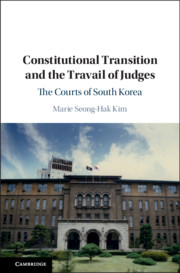Book contents
- Constitutional Transition and the Travail of Judges
- Constitutional Transition and the Travail of Judges
- Copyright page
- Dedication
- Contents
- Figures
- Tables
- Preface
- 1 Introduction
- 2 The Making of the Constitution and the Courts, 1945–1962
- 3 Jurisprudential Evolution, 1962–1972
- 4 The Yusin Era, 1972–1980 (1): The Laws
- 5 The Yusin Era, 1972–1980 (2): The Courts
- 6 The Yusin Era, 1972–1980 (3): The Judges
- 7 Political Transitions and Rule of Law, 1980–1987
- 8 Democracy and Travails of Judges, 1987 to the Present
- 9 Conclusion
- Bibliography
- Index
6 - The Yusin Era, 1972–1980 (3): The Judges
Published online by Cambridge University Press: 23 July 2019
- Constitutional Transition and the Travail of Judges
- Constitutional Transition and the Travail of Judges
- Copyright page
- Dedication
- Contents
- Figures
- Tables
- Preface
- 1 Introduction
- 2 The Making of the Constitution and the Courts, 1945–1962
- 3 Jurisprudential Evolution, 1962–1972
- 4 The Yusin Era, 1972–1980 (1): The Laws
- 5 The Yusin Era, 1972–1980 (2): The Courts
- 6 The Yusin Era, 1972–1980 (3): The Judges
- 7 Political Transitions and Rule of Law, 1980–1987
- 8 Democracy and Travails of Judges, 1987 to the Present
- 9 Conclusion
- Bibliography
- Index
Summary
This chapter discusses the predicaments of judges under constitutional authoritarianism in terms of the recurrent problems in legal theory of the judicial dilemma of unjust laws and conflict between legal positivism and natural law theory. Like antislavery judges in antebellum America, Korean judges under the Yusin Constitution faced an intellectual quagmire between judicial duty and conscience. The dispositional issue was, however, less the morality of the law or the conscience of judges as individuals than the command of the law that imposed limitations on basic rights in the name of state necessity. The Myongdong Democracy Declaration case (1976) reveals the arbitrariness of the emergency decree system in force and showed that the judges faced an uphill battle. The assassination of President Park Chung Hee in 1979 brought the Yusin period to a hasty end.
Keywords
- Type
- Chapter
- Information
- Constitutional Transition and the Travail of JudgesThe Courts of South Korea, pp. 205 - 241Publisher: Cambridge University PressPrint publication year: 2019

